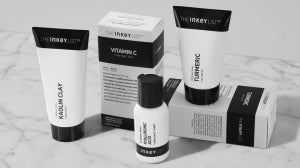
Although the summer months may provide an opportunity for more tanned skin, minimal makeup and sun-kissed hair, exposure to UV rays can also lead to dark spots and pigmentation.
However, we’ve got some top tips that will contribute towards more glowing skin all year round.
What are Dark Spots?
Darks spots, also referred to as ‘hyperpigmentation’, are brown clusters of pigmentation that form on the skin as a result of the overproduction of melanin.
They can appear on different areas of the body depending on the cause, but they are most commonly found on the hands, face, chest and back.
What Causes Dark Spots?
Dark spots can be caused by many different factors, including: -
Sun Exposure: The most common cause of hyperpigmentation is exposure to the sun, as this is thought to stimulate melanin production.
Hormones: Medical journals suggest that the female sex hormones estrogen and progesterone may boost melanin production when the body is exposed to UV rays.
Chloasma and melasma are two examples of hormonal hyperpigmentation.
Age: Age spots tend to occur when the melanin clusters together in specific areas and commonly occur in places that have had repeated sun exposure over a number of years.
Inflammation: Post-inflammatory hyperpigmentation tends to occur due to an increased production of pigment after injury, like a burn, wound, or due to skin conditions, such as acne.
How to Reduce Dark Spots
There are a number of different methods that may be able to reduce the appearance of dark spots, including:
Cryotherapy: This process involves using liquid nitrogen to freeze and reduce the excess melanin found in dark spots. Research on animals suggests this could be an effective method to gradually fade pigmentation.
Laser: Certain laser treatments are thought to help selectively target areas of hyperpigmentation.
Chemical Peels: Treatments involving glycolic acid and salicylic acid may help to break down the outermost layer of the skin and increase keratinocyte turnover.
Skincare: A targeted skincare routine could help to reduce the appearance of dark spots over time.
Sunscreen: This will help to reduce UV exposure to the skin, which will help to reduce stimulating or exacerbating pre-existing hyperpigmentation.
If you aren’t sure which approach to take, we recommend consulting with a dermatologist to determine the most suitable option for you and your skin type.
What Skincare Ingredients Help with Dark Spots?
If you’re looking to improve the appearance of hyperpigmentation, there are a few skincare ingredients that are thought to be able to help.
Vitamin C for Dark Spots
Vitamin C is known for its antioxidant properties and its ability to inhibit melanin production, which could help reduce dark spots and hyperpigmentation.
As an antioxidant, this vitamin may help to support and protect against free radical damage, which has been linked to visible signs of aging, such as age spots.
Alpha Hydroxy Acids
From suppressing melanin production to accelerating the skin’s exfoliation process, AHAs such as glycolic and kojic acids are thought to be able to help improve the appearance of hyperpigmentation in a number of different ways.
You can find these ingredients in skincare products such as serums, toners, cleansers and targeted treatments.
Niacinamide (Vitamin B3)
Topical application of niacinamide is thought to be beneficial for the management of dark spots for a couple of reasons. Firstly, studies have suggested that it may reduce the formation of new dark spots by inhibiting melanin synthesis.
Secondly, as it is purported to help minimise the signs of sun-damaged skin, it may improve existing hyperpigmentation,
There are various concentrated niacinamide serums available that have been specifically formulated for dark spots. Simply find one that’s suitable for your skin type and apply as directed to see if it could help you.
Retinoids
Products containing retinoids (a vitamin A derivative), are thought to be able to help manage dark spots on the skin – depending on the root cause.
Firstly, retinoids help to increase cell turnover on the upper layer of the skin, which could result in a more even-looking complexion. Secondly, some forms may help to inhibit an enzyme required for melanin production, so could potentially reduce more dark spots from forming.
We hope you’ve gained some valuable insights into understanding dark spots and the various beneficial ingredients that could help to manage them.
Armed with this knowledge, it may be time to introduce some new products into your skincare routine.
Explore our blog on our best vitamin C skincare products to kick-start your journey towards achieving a brighter and more even skin tone.









